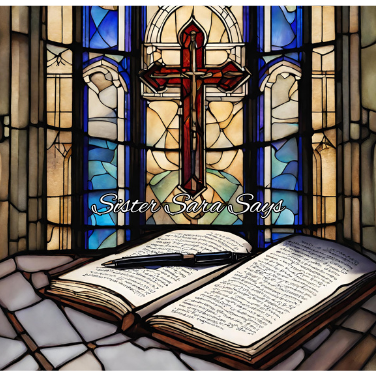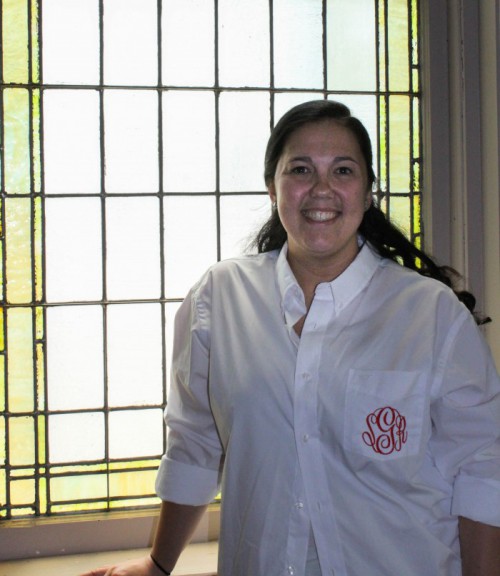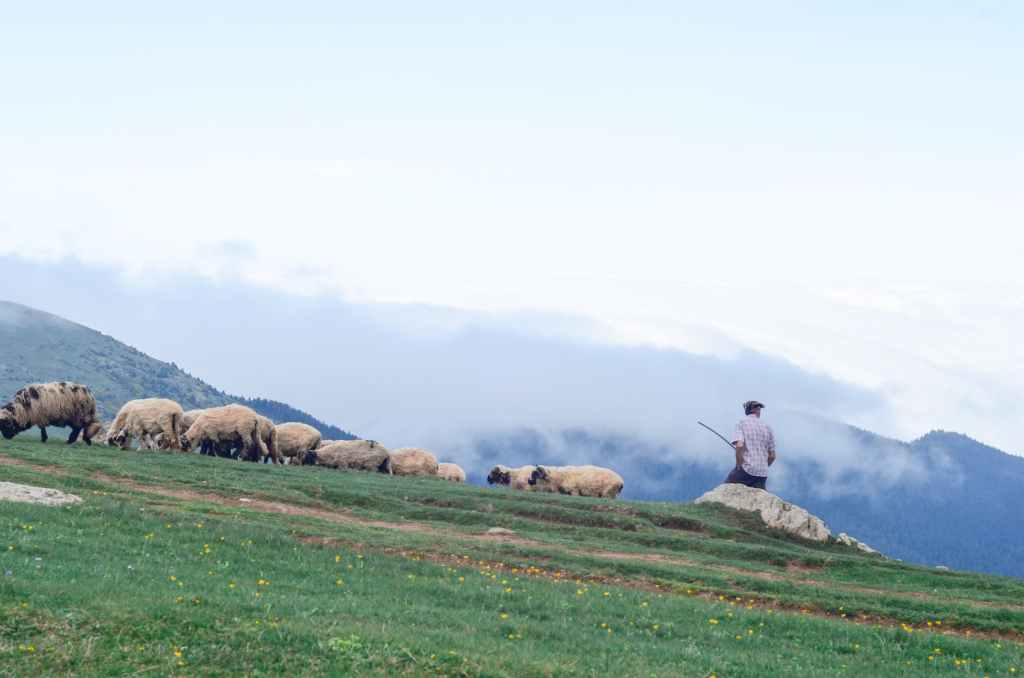Justice Seeking God, we worship today on the land of the Muscogee people, on a land which has a complicated and rich history. We pray for forgiveness for the sins of the past, and for your justice and mercy for all of your creation. -Amen
I hope everyone has had a chance to look over the bulletin inserts that detail just a little bit of the history of what is now the Deaconess Community of the ELCA
As some of you may already know I am in the candidacy process for the ministry of word and service which means when I am ordained I will be a deacon, or a minister of word and service. What you may not know is that I am also joining an intentional community of women known as the Deaconesses, which means I will also be a Sister. Deaconesses are women who also serve as Deacons in the ELCA, who are set apart for a ministry of word and service and live in intentional community.
The vision of the community is as follows. Compelled by the love of Christ and sustained by community, the Deaconess Community of the ELCA works for justice and flourishing for all of God’s creation.
When Pastor asked if I would preach this week, and I looked at the text, the widow and the unrighteous judge, I couldn’t think of a better time to share just a little bit of what I’ve experienced through my time with the Sisters and other candidates, especially when it comes to working for justice, and the flourishing of all of God’s creation.
The widow in our parable today is demanding the justice she knows she deserves from a judge who neither fears God nor respects people. I wish this didn’t sound so familiar. I wish we lived in a time and place where everyone felt like the justice owed to them was delivered.
But since we aren’t there yet, I thought maybe some stories of modern day justice seekers might be a good illumination of the Good news of today’s text.
I wish you could all meet Sister Jane. I wish you could sit with her and listen to her tell stories about her hilarious encounters the police over ending up in the middle of a Nevada highway at night with no headlights on because it was a rental car and they couldn’t figure out where the lights were! I wish you could hear Sister Carol tell the story about how, while Sister Jane was a cottage mother in a group home for teenage boys, she crawled under the fence of a neighbor’s garden, to steal his rabbit traps, because her heart is so big she couldn’t stand the thought of those poor bunnies being hurt.
But its her love for the first nation people of Canada that I really wish you could hear. Sister Jane married a member of a tribe in Canada, and saw the effects that residential schools had on people into their adult lives. She recalls trying to get people to understand the abuse that was happening to the children in residential schools 50 years ago, and no one would listen to her. When I spoke with her this week asking about her experience, she said “I thought this must have been how people felt in Nazi Germany, trying to get people to know what was happening. Because I kept telling people, and no one would listen”
But that never stopped Sister Jane. She became a foster parent and teacher in her community. One day some of the boys, including her foster son were trespassing on city property, and were asked to leave. Obviously that was fine, to ask a group of children to leave a place they shouldn’t be anyway. But the city employees decided to verbally and physically abuse some of the boys, slapping one across the face and knocking his glasses to the ground.
When Sister Jane found out, well you can imagine she was probably something like that widow in our parable today, all fired up. She told her husband, and some of the other foster parents what had happened, and she was met with a chorus of “Jane, this is just the way it is”
Sister Jane refused to accept what those around her had become accustomed to after generations of abuse. She called the police, and explained what happened to the boys. The police officer acknowledged that she was right, agreed to talk to the city employees, and went and checked on the boys. He appreciated her willingness to reach out, especially for one of the boys, the boy whose glasses had been knocked off his face.
That boy came from a family who was in trouble with the law quite a bit. He rarely saw police officers in a positive light. The police officer went to check on him, to make sure he was alright, to tell him that what happened to him was not ok, and to let him know the officer cared. When the officer spoke with Sister Jane again he told her that if she hadn’t called, that boy might never have known there was a police officer who cared about him.
Demanding justice often comes at a price. We know that civil rights leaders in this country, demanding justice for people of color, have been abused, injured, and assassinated. Right before Rev Dr Martin Luther King Jr was assassinated in 1968 he launched what he called the Poor People’s Campaign. He believed that rallying the poor of the country to affect real change was the only way we were going to see moral revival. With the death of both Dr King and Robert Kennedy the movement slowed and stalled, but has been revived in recent years.
I know about this revival because of my fellow candidate Katie. Katie lives in Bangor Maine where she is a Hospice Social Worker. She became involved with the Poor People’s Campaign about two years ago, and I have watched her be transformed as one who demands justice.
As we walk with the community through our rite of accompaniment we are part of the community in all aspects including having a voice but not a vote until we are no longer candidates. That also means we can’t bring resolutions forth before the community for a vote. So when Katie wanted the Deaconess Community to endorse the Poor People’s Campaign, she found other sisters willing to write the resolution with her, and bring it before the community. She educated the sisters via social media before we gathered for our Annual assembly and made sure she had the chance for many one on one conversations about her passions. Because of her persistence, the Deaconess Community of the ELCA endorses the Poor People’s Campaign, and plans to work with our local movements and leaders to affect change where we live.
These stories are great, but we are people of the word first and foremost, and the reason these justice demanding women can fulfill the call on their lives is ultimately because we worship a God who we know hears us. We know it because Jesus says it, right here in this parable. He told them this parable so they would not cease to pray to God and not lose hope. Because if even unrighteous judges will relent, how much More does God love God’s children?
That my friends is a message of hope in a world full of unrighteous judges. That we worship the God who spoke messages of hope and justice through the prophets. The God who came down to earth as Jesus delivered a message of justice that no one was expecting. A message that spoke of justice and mercy for the most marginalized, for the unwanted and the unloved.
Children of God that is the call of a deacon. Those of us who serve as those first deacons served in Acts chapter 6 when the Apostles realized that someone needed to look after the neglected Greek speaking widows. Part of the call of a deacon is to speak publicly in the world in solidarity with the poor and the oppressed, calling for justice and proclaiming Gods love for the world. We also advocate a ministry of word and service that commits itself to risk taking and innovative service on the frontiers of the church’s outreach.
It means we serve and stand alongside our siblings of color who are afraid of the very people tasked to protect them. It means we work to dismantle systems that keep children in cages because their family wanted a better life for them. It means we are radically welcoming to our brothers and sisters in the LGBTQ community. And it means others don’t always agree with us, but we keep loving anyway, we keep preaching the word anyway, and we keep serving anyway, just like our great example of diakonia, or ministry of word and service, Jesus.
Finally I want to tell you about probably the most important Sister in my life. Sister Gladys Reidenour. Sister Gladys was a dancer. Such a good dancer, in fact, that her instructor told her mother she should make it on Broadway. But her mother never told her that. She did tell Gladys that she couldn’t afford to keep dancing. So the holy spirit had another plan for her life.
Sister Gladys graduated with a BS in Nursing and was consecrated as a deaconess in the 1950s. She was a member of Emmanuel Lutheran Church in Pottstown Pennsylvania. While serving as a deaconess she was called by the foreign mission board to serve as a missionary in Malaysia and Singapore, helping to found the fledgling Lutheran church that began there in the 50s. She responded to the call and worked as a medical missionary as well as the administrator of childcare programs at Good Shepherd Lutheran outside Kuala Lampour. She was Emmanuel Lutheran’s first missionary in its 200 year history, in a time when women couldn’t yet serve as Word and Sacrament pastors she left everything she knew to serve the least of these halfway around the world.
She ultimately returned to the states and served as a parish deaconess for Prince of Peace Lutheran Church in Baltimore, running a childcare facility for the church. You may wonder why this sister, who unfortunately passed away in 2013, almost 5 years before I would be accompanied by the community, is the most important Sister in my life.
I was born in Frederick Maryland, about an hour outside of Baltimore, the daughter of a Baptist mother a father with no religious affiliation, who had yet to find a church home about a year after I was born. One day, as my mother would describe it to me years later, a Lutheran Nun knocked on their door. Her name, was Sister Gladys. She had been asked to come up to Frederick and invite families to attend Good Shepherd Lutheran Church, a congregation who had experienced a split and was reaching out to the community.
Sister Gladys knocked on 500 doors, and I was baptized, and 12 years later confirmed at Good Shepherd Lutheran in Frederick Maryland, the place that showed me my call to diaconal ministry. My mother recalls that of the 500 houses that Sister Gladys visited, only one resulted in a family visiting Good Shepherd, my family. I don’t know which door we were, number 5 or number 495, but I’m so glad she didn’t stop knocking.
You have a calling brothers and sisters, and through prayer and relationships within the body of Christ, and the movement of the holy spirit I pray that you are strengthened to live out that call and to keep demanding justice. Keep knocking friends. Keep knocking.





Leave a comment